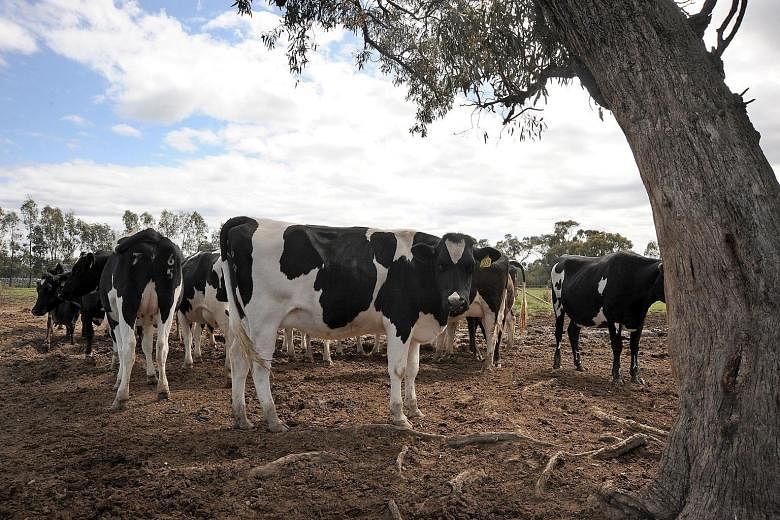Australia is set to become the first country to export live beef cattle to be slaughtered in China in a landmark deal that will seek to satisfy the Chinese population's growing appetite for red meat.
The agreement, approved last week, could see a million cows sold to Beijing within a decade - almost as many as Australia's current total exports. However, the deal was seen by some as a tit-for-tat response against Indonesia, the biggest buyer of Australian live cattle, which suddenly scaled back imports two weeks ago following diplomatic tensions between Jakarta and Canberra.
The head of the Northern Territory Livestock Exporters Association, Mr Stuart Kemp, said the opening up of the Chinese market presented an "exciting" opportunity for Australian farmers. "This deal with China brings tremendous opportunities for quite a long period," he told The Straits Times.
Farmers in Australia were shocked earlier this month after Indonesia drastically cut back its imports from about 250,000 last quarter to just 50,000 for the quarter which started this month.
Just days later, Australia's Agriculture Minister, Mr Barnaby Joyce, revealed that he had approved health protocols for live exports to China, saying the deal could eventually be worth up to A$2 billion (S$1.99 billion) a year.
The exports of feed and slaughter cattle - which can be fed and grown before being slaughtered - will reportedly begin next year with about 40,000 to 50,000 animals.
Mr Kemp said that Indonesia's cuts were "quite disappointing" but he thought the timing of the announcement of the Chinese deal was "coincidence only". "This sort of agreement takes years of planning, and going backwards and forwards (between Canberra and Beijing)," he said.
Last year, Australia exported 1.2 million live beef cattle for feeder, slaughter and breeding purposes at a value of about A$1.3 billion. Indonesia took 730,257 cattle and Vietnam 181,542. China took 117,906 dairy and breeder cattle.
Indonesia has been a big importer of Australian live cattle but the trade has gone through a rocky period in recent years. Controversially, the trade was temporarily suspended by the Labor government in 2011 after reports emerged about cruel practices in some Indonesian abattoirs.
Indonesia insisted its cuts were not a diplomatic rebuke. "(The) decision on the quarterly import permit of live cattle is made on the basis of economic considerations, with the aim of maintaining the right supply of meat for Indonesian consumers," Indonesia's ambassador to Australia Nadjib Riphat Kesoema told ABC News.
However, analysts in Australia said Jakarta's recent cuts may be linked to recent diplomatic tensions. "Julie Bishop (Australia's Foreign Minister) implied that this decision didn't have any anti-Australian implication, but it's hard to imagine it didn't," Professor Kym Anderson, a trade expert from Adelaide University, told Fairfax Media. "There is some payback."
Canberra withdrew its ambassador to Jakarta for five weeks following the execution of two Australian drug smugglers in April. This followed tensions over Australia's policy of towing back asylum-seeker boats to Indonesian waters and Prime Minister Tony Abbott's refusal to apologise to Jakarta over revelations that Australia spied on former president Susilo Bambang Yudhoyono, his wife and his inner circle.
A foreign affairs commentator, Mr Peter Hartcher, said Canberra must broaden its trade partners, particularly following a worsening of relations with Indonesia.
"Canberra needs to… guard against further Indonesian acts of unfriendliness," he wrote in Fairfax Media. "Canberra also needs to seek opportunities patiently to rebuild relations where it can."

